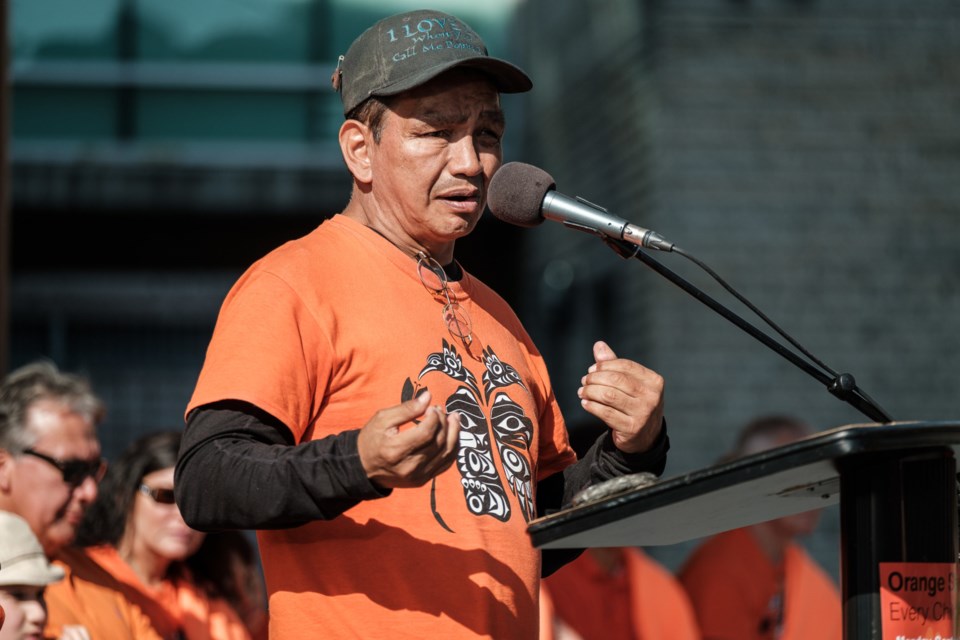Mr. Rogers famously told fans that when something bad or scary happens, his mother always told him to look for the helpers. Indeed, they are legion and since the Tk’emlúps te Secwe̓pemc community revealed they have located the unmarked graves of 215 children at the site of the former Kamloops Indian Residential School, many Canadians have mourned the astounding loss.
But as the country comes together to grieve, we’re again reminded that it’s important to look out for the assholes, too.
People are donning orange t-shirts as a show of solidarity with Tk’emlúps and other communities that suffered through the residential school era. The t-shirts are the work of the Orange Shirt Society, founded in Williams Lake in 1993 by residential school survivor Phyllis Jack-Webstad and her friend Joan Sorley.
Orange Shirt Day has grown from that grassroots commemoration to a national holiday, the National Day for Truth and Reconciliation on September 30.
The non-profit society doesn’t take government funding and relies in part on the proceeds from t-shirt sales to fund their educational work and advocacy for residential school survivors.
So it’s particularly galling to see bottom-feeders take advantage of the outpouring of support by selling counterfeit orange shirts and soliciting fraudulent donations.
On the e-commerce site Etsy I stopped counting after 100. The site returned more than 1,000 hits in a search for orange shirt and “Every Child Matters,” the society’s motto.
Seller Vintage Wooden Watches makes the baffling promise that “Proceeds from these shirts will be donated to the foundation Association of Orange Austria.” Rose Shop by Eve doesn’t bother to even pretend the money goes to the society.
Dozens of the Etsy blatantly rip off Indigenous artists who designed logos for the society.
Amazon has 113 knock-offs on the site. Not to be outdone of course, Facebook has plenty of fakes to flog on your feed.
The proliferation of counterfeit merchandise and donation scams prompted a warning from the Better Business Bureau in B.C.
“I think it’s more about educating people than trying to stop these companies. I used to spend a lot of time on it but I don’t have time,” says Phyllis.
The society has a partnership in place with Leading Edge Promotions based in Langley, which sells the official shirts on the website orangeshirtday.net (not orangeshirtday.org, the society’s own website).
There are other organizations that have asked and received permission from the society to sell t-shirts as a fundraiser for the society, such as Rogers. Phyllis was involved in choosing the artwork for their shirts.
For others, Phyllis asks that a portion of proceeds go to the society but, really, all proceeds above cost should go there or you’re an asshole.
The society has a trademark application in for the slogan “Every Child Matters.”
“It’s not to stop people from using it; it’s to stop people from using in incorrectly, for example, when they steal our designs and other artists’ designs,” she says.
The society needs the money.
Despite their national success in raising awareness of residential schools and a National Day for Truth and Reconciliation, the society is a small organization with a shoestring budget. They don’t take government funding and they don’t have the time, funds or staff to do focused fundraising.
“I thought I’d have to go on EI last year before Christmas, so people making all of this money on shirts and the organization that started, the person who started it, has to go on Unemployment? Something doesn’t add up here,” Phyllis says.
The Orange Shirt Society is a non-profit society. They have applied to the Canada Revenue Agency for charitable status but were turned down, in part Phyllis says, because what they do is “based on unproven facts.”
Tragically, crushingly, no it’s not.
Dene Moore is an award-winning journalist and writer. A news editor and reporter for The Canadian Press news agency for 16 years, Moore is now a freelance journalist living in the South Cariboo. Moore’s two decades in daily journalism took her as far afield as Kandahar as a war correspondent and the Innu communities of Labrador. She has worked in newsrooms in Vancouver, Montreal, Regina, Saskatoon, St. John’s and Edmonton. She has been published in the Globe and Mail, Maclean’s magazine, the New York Times and the Toronto Star, among others. She is a Habs fan and believes this is the year.
SWIM ON:
- Dene Moore last wrote that the Fairy Creek protests have many recalling the ‘War in the Woods’ of the ‘90s. Hopefully this time it won’t take as long to find a solution.
- Rob Shaw on a landmark speech about residential schools, and when the "unimaginable" is all too imaginable.
- Rudy Kelly on trauma, the horror of children removed from their families, and why nobody can or should “get over it” anytime soon.



